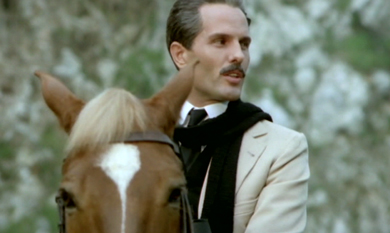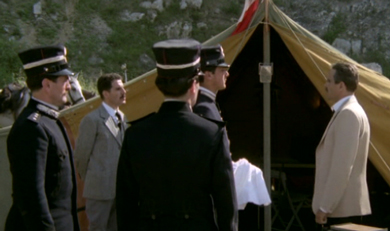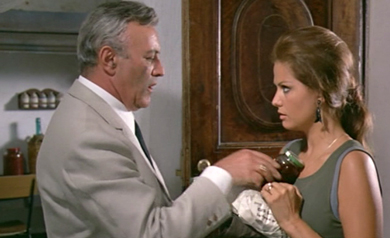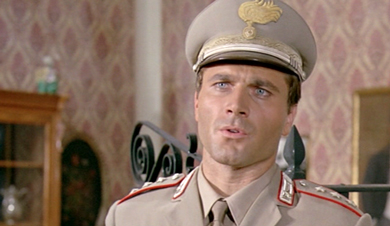
 |
|
|
|
When compared to some Italian directors, Pasquale Squitieri wasn't overly prolific and British and American DVD labels have largely ignored his work up until now. His low budget but highly interesting Spaghetti Western Vengeance Trail is available in the UK but his most popular genre entry -- the gloriously campy Django Against Sartana -- is still missing in action. It seems that Squitieri jumped genres in the early 1970s, abandoning Westerns and devoting his energies mostly to the crime film genre. Far surpassing the quality of his work in the Western genre, I Am the Law is a serious bit of cinema that is distinguished by its beautifully realized historical setting. 
Actually based on historical fact, I Am the Law possesses a pretty compelling narrative. The extreme difficulties that Mori faces are made plain in the film's opening moments when he leaves the train that is taking him to Palermo in order to have a secret meeting with Spano and two informants. The informants are only comfortable talking to the lawmen because they have made plans to flee to France that very night. Spano subsequently warns Mori that local public servants cannot be trusted, citing the fact that certain people in the area were openly talking about the Commissioner's impending arrival before any official announcement had been made. When Mori returns to his train he has an ominous encounter with one Antonio Capecelatro (Rik Battaglia), a criminal who was jailed by the Commissioner during his last clean-up campaign in the region. Treated like a dignitary by the petrified locals, it's clear that Capecelatro has unfinished business with Mori. Although Mori had worked in the locality some years earlier, many of the film's early scenes are of the "new cop on the block" variety. Spano takes Mori around the province's law enforcement departments and the Commissioner is appalled by what he sees. Open acts of intimidation in public and a mixture of corruption and apathy inside courtrooms means that the region's criminals are rarely found guilty of their crimes. Local police officers are seemingly on friendly terms with many of the criminals that are wheeled in and out of the courtrooms. Furthermore, it is apparent that petty criminals are joining the Fascist party because doing so seemingly brings immunity from prosecution too. Once he's got the measure of things Mori gives his staff a real dressing down and insists that they adhere to strict and honest codes of practice. There aren't many action scenes per se in this film but the show does feature some quite shocking bursts of violent activity. Mori was known as the "Iron Prefect" and at one point in the film he expresses the opinion that, if the war on organized crime is to be won, the public must fear the State more than they fear the mafia. To this end, Mori makes a public display of going after a mafia leader alone and he has no qualms about shooting the man dead when he tries to resist arrest. The confrontation brings him into contact with Anna Torrisi (Claudia Cardinale), an outspoken peasant woman who fears for her young son's future. Director Squitieri and his writers use Anna's angry outbursts to articulate concerns about the harsh living conditions endured by the poverty-stricken peasants. When Mori bombastically declares that the State is freeing the peasants from fear Anna angrily declares that she would rather the State freed them from poverty and misery. The hopelessness of peasant life is revealed in the three beatings suffered by a young shepherd: he's beaten by bandits when they steal his sheep, he's beaten by his employer for letting the sheep be stolen and then he's beaten by the police for not revealing the bandits' names. When a band of desperate peasants go on strike, the local priest colludes with landowners and thugs are sent to violently intimidate them. Mori finally determines that their willful silence means that the peasants have effectively become accomplices to crimes and so nobody in the region is innocent as such. This reasoning allows him to impose some draconian but effective measures that prove effective in the fight against rural bandits. It's when Mori goes after the gentlemen crooks - beginning with barons, colonels and the mayor of Palermo city himself -- that his troubles really begin. 
Mori may have a quite fascistic approach to crime fighting but he has little time for the Fascist party or its officials. Given that Palermo's local Fascist party ideologues are keen to show off the power they hold, Mori's anti-Fascist stance adds an extra level of tension and suspense to the proceedings. Mori is clearly coded here as a cultural hero who fearlessly stood up to both the mafia and the Fascist party with little regard for his own personal safety and Giuliano Gemma does a superb job of bringing the crime fighter to life. Indeed, this might be a career best performance from Gemma. The jokey and ebullient personality that the actor brought to his popular Spaghetti Western characters (see Arizona Colt and Ben and Charlie) is nowhere to be found here. Dour, stern and sporting swept back graying hair and a thick mustache, Gemma is almost unrecognizable when he dons Mori's pince nez eyeglasses. The show's well-cast supporting players all turn in equally credible and convincing performances. Some excellent art direction, consistently good sets and costumes and some impressive location work all combine to give the show a proper period feel. The extras-packed siege of a bandit village by masses of police officers is one of several sequences that are wholly successful exercises in filmmaking on a grand and near-epic scale. While the quality of the show's cinematography is generally good, Squitieri's camera placement choices and blocking strategies sometimes seem just a little bit arbitrary. A dramatic and emotionally charged soundtrack score from Ennio Morricone completes an almost perfect film. At its best, the picture quality of this presentation is better than very good: there's next to nothing in the way of scratches or print damage present here. However, a number of the show's dimly lit sequences feature black levels that aren't quite as solid as they could be. The framing of odd shots throughout the show looks slightly tight at times but this remains a very good transfer by and large. The presentation's sound quality is also very good. If Squitieri's other crime films are of a similar quality to I Am the Law it is to be hoped that they are granted English-language friendly DVD releases sometime soon.
|
|
The events depicted in Mafia seemingly seek to suggest that the general dynamics of the fight against organized crime in Sicily changed very little over the years. Most of the problems and obstacles that Captain Bellodi encounters here are pretty much the same as those encountered by Cesare Mori in I Am the Law. Salvatore Colasbena's killer leaves the doomed construction worker's corpse on the country road where it fell, safe in the knowledge that fearful locals will simply pretend that it isn't there. In the end, a cop travelling on a passing bus spots the body: he duly chastises the bus's driver, who maintains that he somehow failed to notice the corpse himself. Circumstantial evidence concerning rivalries in the construction industry tells Bellodi all that he needs to know but finding tangible evidence that will stand up in court proves to be extremely difficult initially. 
Bellodi figures Rosa Nicolosi's unfortunate circumstances might prompt her to help him but she feels that staying loyal to Don Mariano is her best course of action. However, when she starts becoming a nuisance, the mafia choose to destroy Rosa's reputation and confuse Bellodi's investigations by circulating the rumour that she was having an affair with Colasbena: female neighbours shun her in the street while local men now think that they can hit on her whenever they feel like it. Rosa is disbelieving when a man brings her money and a message from her husband, who he claims to have been working with in Palermo but Bellodi's increasingly desperate tactics prompt her to further distance herself from the lawman. Claudia Cardinale turns in a very good performance here as an isolated and anxious woman who is a victim of circumstances beyond her control. Expertly fleshing out an already well-drawn character, Cardinale successfully emotes Rosa's attempts to control the spiraling feelings of despair, fear, helplessness, anger and contempt that threaten to push her over the edge. Bellodi laments that ideals count for nothing in Sicily: if he's to make a breakthrough he must find a traitor who is desperate for money. He duly finds one such man but the experience leaves Bellodi frustrated since the informant will only feed him information in piecemeal dribs and drabs in order to ensure himself a long series of ongoing regular payments. Mafia can be regarded as another one of Franco Nero's quite interesting early career moves. Detailed observation of sometimes mundane police procedural work takes precedence over action scenes here. Bellodi is a clean-cut, handsome, idealistic and courageous character who is prepared to bend the rules a little in order to provoke a reaction that might assist his investigations. But he's also an acutely ineffective and powerless character who only makes progress in his investigations when others deign to help him. New to the area, he's culturally out of his depth and the mafia men know this. Lee J. Cobb does good work as the generally calm, collected but thoroughly ruthless Don Mariano. Cobb's considered approach here means that his "Hollywood star abroad" status does not act as a distraction and he mingles comfortably with the less familiar local actors who make up his mob. Don Mariano possesses a disturbing personal philosophy, which divides humanity into five categories of worth, and this seemingly allows him to order the execution of those who get in his way without a flicker of compassion or regret. The balcony of Don Mariano's house faces Bellodi's police station across a busy town centre and the mafia head and his lieutenants enjoy sitting and watching activities at the station unfold. Bellodi tries to rattle Mariano by arresting a number of his underlings and holding them at the station but Mariano is too much of a professional to be unduly worried by such tactics. Cobb cuts quite a regal figure when Mariano walks around town, enjoying the privileges and respect that the locals afford him. 
Damiano Damiani worked in a variety of genres but, since he signed his name to finely crafted shows like Mafia, The Most Beautiful Wife and Confessions of a Police Captain, many film fans think of him as a director who specialized in crime films. Damiani's stylistic approach here is more measured and understated than usual but it remains very effective. The show's thoughtful and equally understated art direction successfully creates an early 1960s vibe. The film's exterior scenes utilize some great locations and the use of non-professional actors in some sequences adds a sense of realism to the proceedings. The film's technical crew includes two noted Sergio Leone regulars: the cinematographer Tonino Delli Colli and the editor Nino Baragla. The composer Giovanni Fusco provides a suitably dramatic and emotionally charged soundtrack score. Mafia's intelligent and scathing content results in a film that is a worthy addition to both Damiano Damiani's personal filmography and the Italian crime film genre in general. This is a really excellent presentation. The picture quality here is outstanding and surely rates as one of Wild East's most pleasing restorations yet. The show's picture is pin sharp and colourful and there's nothing in the way of print damage, scratches or flecks present. There are one or two shots where the framing looks ever so slightly tight but this remains a top quality transfer. The presentation's sound quality is very good for the most part too. There are odd outbreaks of crackles and the like from time to time but these don't pose a problem. This presentation of Mafia is the longer Italian version of the film: as such Wild East have added English language subtitles to those sections of the show for which no English language audio tracks could be found.
On a scale of Excellent, Good, Fair, and Poor,
Mafia rates:
Reviews on the Savant main site have additional credits information and are often updated and annotated with reader input and graphics. Also, don't forget the 2010 Savant Wish List. T'was Ever Thus.
Review Staff | About DVD Talk | Newsletter Subscribe | Join DVD Talk Forum |
| |||||||||||||||||||||